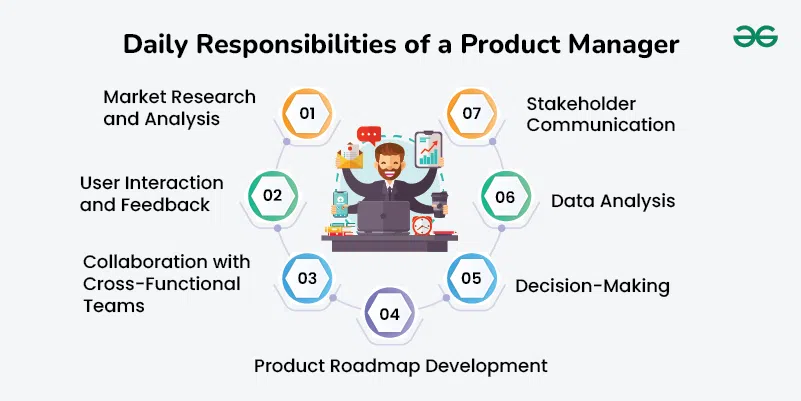
|
|
What does a Product Manager do? is the question that came to our mind, before getting into their course. In this article, we are going to learn just that, and so many things. A Product Manager is a key role in product development and management within a company. The responsibilities of a Product Manager can vary based on the organization’s structure, industry, and specific product offerings, but generally, they play a central role in guiding a product from ideation to market launch and ongoing improvement.  What does a Product Manager do Table of Content
What does a Product manager do?A Product Manager is a key role in product development and management within a company. The responsibilities of a Product Manager can vary based on the organization’s structure, industry, and specific product offerings, but generally, they play a central role in guiding a product from ideation to market launch and ongoing improvement. Here are the core responsibilities of a Product Manager: Daily Responsibilities of a Product Manager Daily Responsibilities of a Product Manager 1. Market Research and Analysis
2. User Interaction and Feedback
3. Collaboration with Cross-Functional Teams
4. Product Roadmap Development
5. Decision-Making
6. Data Analysis
7. Stakeholder Communication
Key Result Areas (KRAs) of a Product Manager-of-a-Product-Manager.webp) Key Result Areas (KRAs) of a Product Manager 1. Product Success
2. User Satisfaction
3. Timely Delivery
4. Cross-Functional Collaboration
5. Innovation and Adaptability
The Business Impact of a Product Manager’s WorkA Product Manager’s role is integral to the success of a business, with far-reaching impacts across various aspects: 1. Strategic Alignment with Business GoalsA Product Manager’s daily tasks align with the overarching business strategy. Their ability to set a clear product vision and roadmap ensures that the product contributes directly to the achievement of company goals. 2. Market Responsiveness and CompetitivenessBy staying attuned to market trends, a Product Manager positions the product to respond promptly to changes. This adaptability enhances the product’s competitiveness and helps the business maintain relevance in a dynamic market. 3. Customer-Centric ApproachThe daily focus on user satisfaction and continuous improvement directly impacts customer loyalty. A satisfied customer base contributes to repeat business, positive word-of-mouth, and long-term success. 4. Efficient Resource UtilizationEffective prioritization and decision-making by Product Managers lead to efficient resource utilization. This, in turn, positively impacts the company’s bottom line by optimizing costs and maximizing returns. 5. Agile Innovation for Market LeadershipProduct Managers who embrace Agile methodologies foster a culture of innovation. This commitment to continuous improvement positions the business as a market leader, driving growth and setting industry standards. Product Manager Career PathThe Product Manager career path begins as Associate Product Manager, progressing to a Product Manager role, and then to Senior Product Manager in Product Management. Advancement may lead to leadership positions like Group Product Manager or Director of Production Management. .webp) Product Manager Career Path List of Product Management Roles
Parts of the Product Manager RoleProduct Management encompasses various roles, each contributing to the success of a product. Here are some key roles within Product Management:
Why Pursue a Career in Product Management?Here are the following Reasons for which we can pursue a career in product management:
What is the Average Salary for a Product Manager?The Average Salary of Product Manager ranges from 13 lakhs to 30 lakhs per year, dependent on experience and skills, product managers in India earn an average of about Rs. 16,60,000 yearly. The starting salaries are sizable at 5-8 lakhs per year, profit-sharing benefits can increase starting earnings by 50,000 to 1 lakh. The compensation depends on various variables, including geography, industry, background, and firm size. Here is a table showing the average salary for a Product Manager in rupees (INR) for the top 10 product-based companies:
Note: The salaries mentioned above are approximate values and may vary based on experience, location, and other factors.
Frequently Asked Questions – What does a Product Manager do?1. What does a Product Manager do all day?
2. What are the skills required for product manager?
3. Do product managers need to code?
4. What are the 3 functions of product management?
5. Are product managers paid well?
|
Reffered: https://www.geeksforgeeks.org
| Product Management |
Type: | Geek |
Category: | Coding |
Sub Category: | Tutorial |
Uploaded by: | Admin |
Views: | 15 |